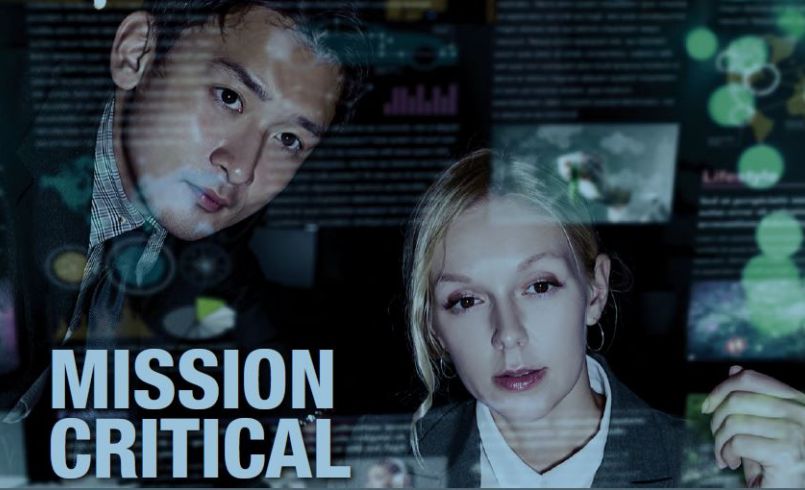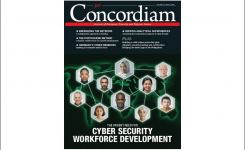- George C. Marshall European Center for Security...
- Latest Issue of ‘per Concordiam’ on Cybersecuri...
Latest Issue of ‘per Concordiam’ on Cybersecurity Published on Marshall Center Website
per_c_9.jpg

By Christine June
Public Affairs Office
George C. Marshall European Center for Security Studies
GARMISCH-PARTENKIRCHEN, Germany (Jan. 4, 2019) – The 33rd issue of ‘per Concordiam’ highlights “Mission Critical: Protecting Essential Infrastructure from Cyber Attacks.”
This special cyber edition covers a wide range of cyber security topics with a common thread: how best to protect critical infrastructure in the face of increasingly sophisticated threats by states and by state-sponsored and non-state actors.
Several Marshall Center alumni contributed to this special edition of ‘per Concordiam.’
It has just been released and is posted on the Marshall Center website as a .pdf: http://ow.ly/7suE30nbUmb
The Marshall Center's 'per Concordiam' magazine is a quarterly journal covering European and Eurasian Security and Defense issues.
“The sophistication level of cyber threats to national security has increased exponentially over the past few years. Regionally and throughout the world, these challenges differ based on the penetration level of internet and mobile communications and the unequal distribution of expertise in given areas. As such, the overlaying, global nature of cyberspace makes examining real-world case studies and trends equally vital,” said retired U.S. Army Lt. Gen. Keith W. Dayton, in the magazine’s regular feature titled “Director’s Letter.” (Page 4)
This issue is full of alumni contributions and its features include:
Lessons from Ukraine: Russia’s multilayered cyber assaults know no bounds, by Col. Viktor Lisakonov, chief of the Information Assurance Directorate, Ukrainian General Staff. He attended the Marshall Center’s Program on Cyber Security Studies 17-04. Col. Viktor Lisakonov is head of the Information Assurance Directorate within the General Staff of the Ukrainian Armed Forces. He helped establish the Ukrainian military Information Assurance and Cyber Defence System. During a 30-year career, he has held various command and staff positions and has experience with peacekeeping operations. His current focus is on developing military cyber defense capabilities. (Page 6)
Resilience is Key, How to thwart known, and unknown, dangers, by Lt. Col. Darko Galinec, Ph.D., Ministry of Defense of the Republic of Croatia. He graduated from the Marshall Center’s Program on Cyber Security Studies 17-04. He is the head of Croatia’s Information Systems Security and Control Section in the Sector of Information and Communications Systems of the Ministry of Defence. He has held many positions in the ministry’s information and communications systems, including those responsible for upholding NATO’s Cyber Defence Pledge. (Page 14)
Public-Private Partnerships, Building a strong foundation for protecting vital services, by Agnieszka Wierzbicka, Department of Cyber Security at the Polish Ministry of Digital Affairs. She is a graduate of the Marshall Center’s Leaders’ Program on Applied Security Studies 11-10. (Page 22)
30 Reducing Risk, The Czech Republic responds to growing threats, by Veronika Netolická and Martin Konečný. (Page 30)
Other topics include:
SECURITY:
Spain’s Digital Defenses, Applying innovative models to protect critical infrastructure, by Alberto Hernández, CEO, National Cybersecurity Institute of Spain (INCIBE). (Page 36)
Rebooting Security, An innovative plan for protecting Georgia’s critical infrastructure, by Andria Gotsiridze and Maka Petriashvili. Andria Gotsiridze attend the Marshall Centers Program on Cyber Security Studies 16-04. He was director of the Cyber Security Bureau of the Ministry of Defense of Georgia from 2014 to 2016. He was the ministry’s inspector general with an expertise in security sector reform, fighting corruption and foreign intelligence. Under his leadership, the ministry’s Cyber Security Bureau developed Georgia’s first cyber security defense policy and strategy and initiated a number of security projects. He is currently involved in several projects as a cybersecurity advisor at the Georgia Innovation and Technology Agency. (Page 42)
A Present Concern, as internet usage soars, Kosovo must harden its defenses, by Hafize Bajrami, IT chief, Ministry for the Kosovo Security Force. She attended Marshall Center’s Program on Cyber Security Studies and a Cyber Security Community of Interest event in 2017. She has been chief of the information technology (IT) section in the Ministry for the Kosovo Security Forces since 2009 and a member of the Kosovo National Cyber Security Council since 2016. She holds a master’s degree in telecommunications from the University of Pristina and spent two years as an IT engineer in the private sector. (Page 48)
POLICY:
Wicked Threats, Strategic foresight is required to defend cyberspace, by Maj. Walbery Nogueira de Lima e Silva, Brazilian Army. (Page 54)
COOPERATION:
Hacking the Pentagon, A regional conference and friendly Pentagon cyber sleuths help bolster security, by per Concordiam Staff. (Page 58)
Strength in Numbers, Perspectives on the Africa Endeavor 2017 symposium, by Capt. Domingos Tavares, Armed Forces of Cape Verde. (Page 62)
There are numerous foreign policy and security publications throughout the world; what makes ‘per Concordiam’ unique is its regional connection via the Marshall Center alumni network, said Patrick Swan, ‘per Concordiam’ managing editor.
The topics covered in ‘per Concordiam’ are brought to the Marshall Center by resident course graduates and the organizations in which they work today.
In addition to contributions from alumni, ‘per Concordiam’ is an internationally distributed journal open to outside contributors who wish to comment on matters of importance to European and Eurasian Security and Defense issues. This includes scholars, policy-makers and practitioners.
Topics for the 2019 editions of 'per Concordiam’:
Economic security. This issue will include, but not be exclusive to, a review of how economic sanctions and energy security affect economic security.
Northern European states regional (Arctic) security challenges. This issue will look at security threats unique to this geographic region.
Strategic Communication in the age of post-truth. This issue addresses state and non-state instigators who use disinformation and misinformation with a strategic design to influence other nations or peoples to their advantage.
Hybrid Warfare. This issue will examine the use of a broad range of subversive instruments, many of which are non-military, to further the instigator’s strategic objectives. It will discuss how to counter them.
Those interested in contributing articles should email editor@perconcordiam.org
‘Per Concordiam’ is published on the Marshall Center Website: http://ow.ly/AppO30lQ1W6.


